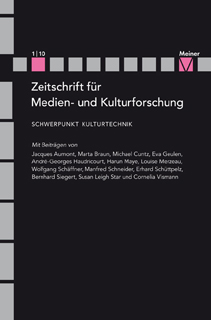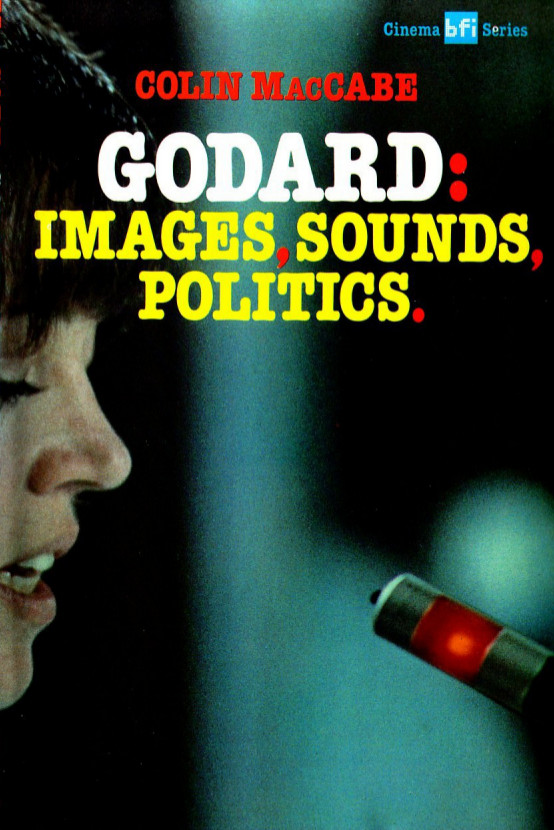Zeitschrift für Medien- und Kulturforschung (1/2010) – Kulturtechnik [German]
Filed under journal | Tags: · cultural techniques, culture, media theory, photography, technology

Seit der Antike schließt das europäische Verständnis von Kultur die Vorstellung ein, daß Kultur technisch konstituiert ist. Schon im Wort ‘Kultur’ (lat. colere, cultura) steckt insofern ein eminent technischer Sinn, als mit cultura die Entwicklung und praktische Anwendung von Techniken zur Urbarmachung des Bodens und zur Besiedelung der Erde mit Wohnsitzen und Städten gemeint ist. Noch im 19. Jahrhundert wäre ein Konzept namens “Kulturtechnik” daher ganz selbstverständlich innerhalb der Agrar- oder Geowissenschaften angesiedelt worden.
Innerhalb der medienkulturwissenschaftlichen Diskussion, in die der Begriff heute eingerückt ist, bezeichnen “Kulturtechniken” dagegen Praktiken und Verfahren der Erzeugung von Kultur, die an der Schnittstelle von Geistes- und Technikwissenschaften ansetzen und als Bedingung der Möglichkeit von Kultur überhaupt begriffen werden. Dieses technische Verständnis von Kultur bricht mit der bildungsbürgerlichen Tradition des 19. Jahrhunderts, die unter Kultur die Sphäre der hohen Kunst, der Bildung und des guten Geschmacks verstand. Das Konzept ist nicht auf die sogenannten elementaren Kulturtechniken (Lesen, Schreiben, Rechnen) beschränkt, sondern beinhaltet auch die Techniken des Körpers, Repräsentationsverfahren und andere Medientechniken.
Mit Beiträgen von Jacques Aumont, Eva Geulen, Marta Braun, Louise Merzeau, André-Georges Haudricourt, Michael Cuntz, Erhard Schüttpelz, Harun Maye, Wolfgang Schäffner, Bernhard Siegert, Cornelia Vismann, Manfred Schneider, Susan Leigh Star.
Edited by Lorenz Engell and Bernhard Siegert
Publisher Felix Meiner, Hamburg
ISBN 9783787319510
228 pages
PDF (updated on 2014-8-31)
See also Cultural techniques at Monoskop wiki
Colin MacCabe: Godard: Images, Sounds, Politics (1980)
Filed under book | Tags: · cinema, film, film theory, maoism, montage, photography, politics, sexuality, technology, television

Godard: Images, Sounds, Politics is an important step in making Godard’s experiments in image and sound beyond the institutions of cinema and television visible. It reads the earlier films through the more recent work, focusing on politics, technology and sexuality. These insistent themes dominate Godard’s investigation of our representation in the image, a representation always inflected by sound. These terms enable us to understand more critical the circulation of money and images in which we participate, a circulation which Godard’s work cuts across.” (from the back cover)
Includes essays by Colin MacCabe, Laura Mulvey, and Mick Eaton. Also features interviews with Godard, a filmography, and a selected bibliography. Printed in black-and-white.
With Mick Eaton and Laura Mulvey
Design Richard Hollis
Publisher The Macmillan Press, London and Basingstoke, 1980
British Film Institute Cinema series
ISBN 0333290739, 9780333290736
175 pages
review of the book’s design (Eye Magazine)
Comment (0)Friedrich Kittler: Optical Media: Berlin Lectures 1999 (2002–)
Filed under book | Tags: · art, art history, computer art, computing, film, film history, history of photography, image, media archeology, painting, philosophy, photography, technology

“This major new book provides a concise history of optical media from Renaissance linear perspective to late twentieth-century computer graphics. Kittler begins by looking at European painting since the Renaissance in order to discern the principles according to which modern optical perception was organized. He also discusses the development of various mechanical devices, such as the camera obscura and the laterna magica, which were closely connected to the printing press and which played a pivotal role in the media war between the Reformation and the Counter-Reformation.
After examining this history, Kittler then addresses the ways in which images were first stored and made to move, through the development of photography and film. He discusses the competitive relationship between photography and painting as well as between film and theater, as innovations like the Baroque proscenium or “picture-frame” stage evolved from elements that would later constitute cinema. The central question, however, is the impact of film on the ancient monopoly of writing, as it not only provoked new forms of competition for novelists but also fundamentally altered the status of books. In the final section, Kittler examines the development of electrical telecommunications and electronic image processing from television to computer simulations.
In short, this book provides a comprehensive introduction to the history of image production that is indispensable for anyone wishing to understand the prevailing audiovisual conditions of contemporary culture.”
Publisher Merve, Berlin, 2002
Internationaler Merve Diskurs series, 250
ISBN 3883961833, 9783883961835
331 pages
English edition
Translated by Anthony Enns
With an introduction by John Durham Peters
Publisher Polity, 2009
ISBN 0745640915, 9780745640914
vi+250 pages
Reviews: Anthony Enns (Electronic Book Review 2004), Nicholas Gane and Hannes Hansen-Magnusson (Theory Culture Society 2006), Kiss (2006, HU), Bohár (HU), Jussi Parikka (2011).
Publisher (DE)
Publisher (EN)
Worldcat (DE)
Worldcat (EN)
Optische Medien. Berliner Vorlesung 1999 (German, 2002, added on 2016-8-13, removed on 2017-8-10 upon request from publisher – read first two chapters)
Optical Media: Berlin Lectures 1999 (English, trans. Anthony Enns, 2009)

